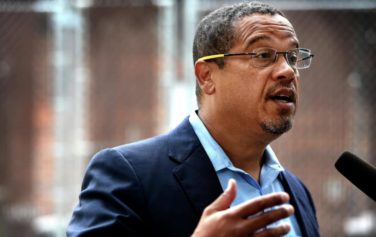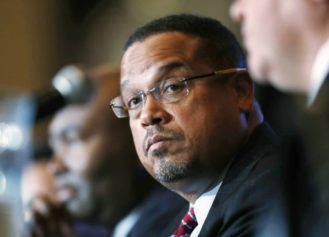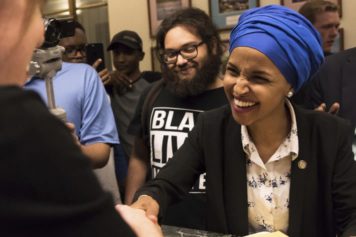
Tom Perez (left) and Keith Ellison
The fight for the soul of the DNC isn’t in convention halls. It’s in the street.
The significance of Tom Perez’ election as the Democratic National Committee’s new leader could be reduced to the scene of Keith Ellison supporters chanting, “Party of the people, not big money!” at the end of the vote.
It could. It probably shouldn’t.
That’s because attendees left with a fundamental question unanswered. Does the DNC set the agenda for the fight against Republicans and Donald Trump anymore at all, regardless of who happens to ply the gavel?
“America has never needed the Democratic Party more than they do right now,” Atlanta mayor Kasim Reed told DNC members Friday, with broad calls for unity within the party. “That will mean the end of the presidency of Donald Trump.”
But the tone from the floor was somewhat different.
“You want to know who the DNC is now?” Howard Dean asked a lunch crowd Friday. “The kids that organized the protests at the airports.”
Dean, who supported the upstart campaign of South Bend, Ind., mayor Pete Buttigieg, railed against politics as usual in an environment where three million people take to the streets in protest with nary a word from formal Democratic leaders.
“Top-down politics does not work, and no one under 35 believes top-down politics works,” Dean said.“They didn’t need institutions. … What do they need politicians for? What do they need politics for? That’s the case that we need to make.”
“A lot of people are still stunned,” said Ralph Dawson, a DNC member from New York. “We need to focus most of our energies on the elections to come. Our party needs to mesh with protest, not take it over.”
Just before, Dawson had taken a phone call while watching Dean — his college roommate — speak on behalf of Buttigieg. The call was from former vice president Joe Biden. Biden had endorsed rival Perez and was checking in on the quality of the competition.
Perez won much of the support of the Obama partisans within the DNC and took some heat for appearing to be the candidate of the Democratic Party’s consultant class. From the floor, the contrast between the Perez supporters in business suits and the working-class Berniecrats wasn’t hard to see.
After his 2008 victory, Obama demanded that the DNC cease accepting corporate donations. The DNC, in turn, dramatically cut its financial contributions to state parties and local elections. Meanwhile, Republican leaders quietly began an intense focus on picking up state and local seats through a combination of big money flowing into state elections and the legislative and legal attack on voting rights law.
Much of the discussion among rank-and-file members centered on what might be done to rebuild from the stark losses at the state and local level — more than 1,000 seats in legislatures and city councils, in governorships and statewide offices and in Congress — over the past eight years.
Ellison, Perez and other DNC chair candidates pledged more top-level support for state parties and local races.
“The key is to go to school on it,” Perez said in a CNN debate earlier this month. He advocates more money to state parties — as anyone looking for votes from state party leaders might — along with establishing a best-practices learning system to transfer victories from one race to others and to provide expertise on cybersecurity and election training from the national level to states. “We have to get back to the service culture.”
It is, perhaps, this fear of being financially out competed that drove the DNC to lift the corporate funding ban last year. A movement to renew the ban was squashed by the members in a vote just before the chair election, to the vocal disapproval of many of the Ellison supporters watching events unfold in the audience.
On the streets outside of the convention, Atlanta’s progressive community held a march for health care that attracted nearly as many people as crowded the caverns of the AmericasMart tradeshow hall in downtown Atlanta. They deliberately marched by the convention hall to demand its members fight for the Affordable Care Act.
“The DNC needs to listen to the people,” said Janel Green, leading the health care march Saturday. Green also organized the local social justice march after the inauguration, which filled the streets downtown with more protesters than any event since the Vietnam War. “They need to meet with voters to learn from their losses. They need to be willing to change their structure and communication strategies to effectively reach and engage millennials. They especially need to go to rural America. Learn what the real needs of those rural communities are and how to effectively communicate how the DNC platform will greatly benefit rural communities.”
Many of the more progressive activists in attendance — the Bernie Sanders wing of the Democratic Party, local veterans of the Occupy movement — plainly viewed the match up as a proxy to re-litigate the primary election loss to Hillary Clinton.
Both men hold symbolic value to progressives fighting against attacks on non-Christians and immigrants by the Trump administration. Ellison was the first Muslim elected to Congress, while Perez is the child of formerly undocumented immigrants. The campaign planks of both men were nearly indistinguishable and both profess a personal friendship and a long working relationship.
But it was Ellison who earned Sanders’ early endorsement and with it a crowd of Sanders partisans willing to walk off the floor, fists in the air, after Ellison’s defeat. Perez immediately turned to Ellison to make him deputy chairman of the party — more symbolism, since the position is undefined.
Still, Ellison had been calling for gestures of unification through the convention.
Asking for unity “doesn’t mean you can’t be passionate,” Ellison told supporters Friday night, but “no one benefits from us fighting each other, other than Trump. … Unity is critically important. We have to come out of this process together. We have to come out of this process united.”
“Unity is critically important. We have to come out of this process together. We have to come out of this process united.”


